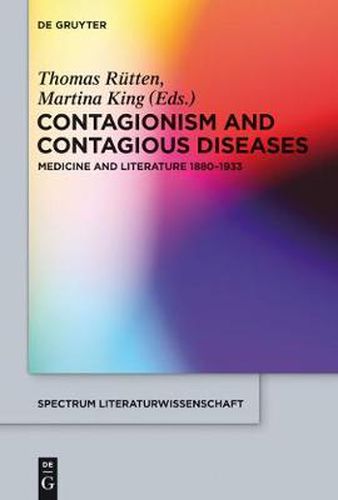Readings Newsletter
Become a Readings Member to make your shopping experience even easier.
Sign in or sign up for free!
You’re not far away from qualifying for FREE standard shipping within Australia
You’ve qualified for FREE standard shipping within Australia
The cart is loading…






This title is printed to order. This book may have been self-published. If so, we cannot guarantee the quality of the content. In the main most books will have gone through the editing process however some may not. We therefore suggest that you be aware of this before ordering this book. If in doubt check either the author or publisher’s details as we are unable to accept any returns unless they are faulty. Please contact us if you have any questions.
The idea of contagious transmission, either by material particles or by infectious ideas, has played a powerful role in the development of the Western World since antiquity. Yet it acquired quite a precise signature during the process of scientific and cultural differentiation in the 19th and early 20th centuries. This volume explores the significance and cultural functions of contagionism in this period, from notions of infectious homosexuality and the concept of social contagion to the political implications of bacteriological fieldwork. The history of the concept ‘microbe’ in aesthetic modernism is adressed as well as bacteriological metaphors in American literary historiography.
Within this broad framework, contagionism as a literary narrative is approached in more focussed contributions: from its emotional impact in literary modernism to the idea of physical or psychic contagion in authors such as H.G. Wells, Kurt Lasswitz, Gustav Meyrinck, Ernst Weiss, Thomas Mann and Max Frisch. This twofold approach of general topics and individual literary case studies produces a deeper understanding of the symbolic implications of contagionism marking the boundaries between sick and healthy, familiar and alien, morally pure and impure.
$9.00 standard shipping within Australia
FREE standard shipping within Australia for orders over $100.00
Express & International shipping calculated at checkout
This title is printed to order. This book may have been self-published. If so, we cannot guarantee the quality of the content. In the main most books will have gone through the editing process however some may not. We therefore suggest that you be aware of this before ordering this book. If in doubt check either the author or publisher’s details as we are unable to accept any returns unless they are faulty. Please contact us if you have any questions.
The idea of contagious transmission, either by material particles or by infectious ideas, has played a powerful role in the development of the Western World since antiquity. Yet it acquired quite a precise signature during the process of scientific and cultural differentiation in the 19th and early 20th centuries. This volume explores the significance and cultural functions of contagionism in this period, from notions of infectious homosexuality and the concept of social contagion to the political implications of bacteriological fieldwork. The history of the concept ‘microbe’ in aesthetic modernism is adressed as well as bacteriological metaphors in American literary historiography.
Within this broad framework, contagionism as a literary narrative is approached in more focussed contributions: from its emotional impact in literary modernism to the idea of physical or psychic contagion in authors such as H.G. Wells, Kurt Lasswitz, Gustav Meyrinck, Ernst Weiss, Thomas Mann and Max Frisch. This twofold approach of general topics and individual literary case studies produces a deeper understanding of the symbolic implications of contagionism marking the boundaries between sick and healthy, familiar and alien, morally pure and impure.